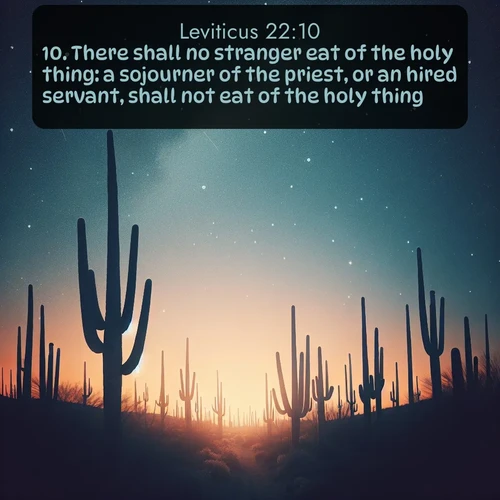Leviticus 22:10 plusieurs versions / traductions
English Bible Translations
10. There shall no stranger eat of the holy thing: a sojourner of the priest, or an hired servant, shall not eat of the holy thing.
10. There shall no stranger eat of the holy thing: a sojourner of the priest's, or a hired servant, shall not eat of the holy thing.
10. No outside person may take of the holy food, or one living as a guest in the priest's house, or a servant working for payment.
10. And no stranger shall eat the holy thing; the sojourner with the priest, and the hired servant, shall not eat of the holy thing.
10. There shall no stranger eat of the holy thing: a sojourner of the priest, or a hired servant, shall not eat of the holy thing.
10. `And no stranger doth eat of the holy thing; a settler of a priest and an hireling doth not eat of the holy thing;
German Bible Translations
10. Kein anderer soll von dem Heiligen essen noch des Priesters Beisaß oder Tagelöhner. {~} {~}
French Bible Translations
10. »Aucune personne étrangère ne mangera des offrandes saintes: ni celui qui loge chez un prêtre ni son salarié ne mangeront des offrandes saintes.
10. Aucun étranger ne mangera des choses saintes; celui qui demeure chez un sacrificateur et le mercenaire ne mangeront point des choses saintes.
10. Aucun étranger ne mangera des choses saintes; celui qui demeure chez un sacrificateur et le mercenaire ne mangeront point des choses saintes.
10. Et aucun étranger ne mangera de ce qui est saint; celui qui demeure chez un sacrificateur, et l'homme à gages, ne mangeront pas de ce qui est saint.
10. Nul étranger aussi ne mangera des choses saintes; le forain logé chez le Sacrificateur, et le mercenaire, ne mangeront point des choses saintes.
10. Or nul étranger ne mangera des choses consacrées; celui qui demeure chez un sacrificateur, et le mercenaire, ne mangeront point des choses saintes.
Versions with Strong Codes
Leviticus 22 / KJV_Strong10. There shall no[H3808] [H3605] stranger[H2114] eat[H398] of the holy thing:[H6944] a sojourner[H8453] of the priest,[H3548] or a hired servant,[H7916] shall not[H3808] eat[H398] of the holy thing.[H6944]
Strong Code definitions
H3808 lo' lo or lowi {lo}; or loh (Deut. 3:11) {lo}; a primitive particle; not (the simple or abs. negation); by implication, no; often used with other particles (as follows):--X before, + or else, ere, + except, ig(-norant), much, less, nay, neither, never, no((-ne), -r, (-thing)), (X as though...,(can-), for) not (out of), of nought, otherwise, out of, + surely, + as truly as, + of a truth, + verily, for want, + whether, without.
H3605 kol kole or (Jer. 33:8) kowl {kole}; from H3634; properly, the whole; hence, all, any or every (in the singular only, but often in a plural sense):--(in) all (manner, (ye)), altogether, any (manner), enough, every (one, place, thing), howsoever, as many as, (no-)thing, ought, whatsoever, (the) whole, whoso(-ever).
H2114 zuwr zoor a primitive root; to turn aside (especially for lodging); hence to be a foreigner, strange, profane; specifically (active participle) to commit adultery:--(come from) another(man, place), fanner, go away, (e-)strange(-r, thing, woman).
H398 'akal aw-kal' a primitive root; to eat (literally or figuratively):--X at all, burn up, consume, devour(-er, up), dine, eat(-er, up),feed (with), food, X freely, X in...wise(-deed, plenty), (lay) meat, X quite.
H6944 qodesh ko'-desh from H6942; a sacred place or thing; rarely abstract, sanctity:--consecrated (thing), dedicated (thing), hallowed (thing), holiness, (X most) holy (X day, portion, thing), saint, sanctuary.see H6942
H8453 towshab to-shawb' or toshab (1 Kings 17:1) {to-shawb'}; from H3427; a dweller (but not outlandish (5237)); especially (as distinguished from a native citizen (active participle of H3427) and a temporary inmate (1616) or mere lodger (3885)) residentalien:--foreigner, inhabitant, sojourner, stranger. see H3427&volume=KJV_strong' target='_self' >H3427see H5237 see H3427&volume=KJV_strong' target='_self' >H3427 see H1616 see H3885
H3548 kohen ko-hane' active participle of H3547; literally, one officiating, a priest; also (by courtesy) an acting priest (although a layman):--chief ruler, X own, priest, prince, principal officer.see H3547
H7916 sakiyr saw-keer' from H7936; a man at wages by the day or year:--hired (man, servant), hireling. see H7936
H3808 lo' lo or lowi {lo}; or loh (Deut. 3:11) {lo}; a primitive particle; not (the simple or abs. negation); by implication, no; often used with other particles (as follows):--X before, + or else, ere, + except, ig(-norant), much, less, nay, neither, never, no((-ne), -r, (-thing)), (X as though...,(can-), for) not (out of), of nought, otherwise, out of, + surely, + as truly as, + of a truth, + verily, for want, + whether, without.
H398 'akal aw-kal' a primitive root; to eat (literally or figuratively):--X at all, burn up, consume, devour(-er, up), dine, eat(-er, up),feed (with), food, X freely, X in...wise(-deed, plenty), (lay) meat, X quite.
H6944 qodesh ko'-desh from H6942; a sacred place or thing; rarely abstract, sanctity:--consecrated (thing), dedicated (thing), hallowed (thing), holiness, (X most) holy (X day, portion, thing), saint, sanctuary.see H6942
Prédications qui analysent les thèmes Lévitique 22
Thèmes : Holiness of Offerings; Acceptable SacrificesRelated Sermons discussing Leviticus 22
Themes : Holiness of Offerings; Acceptable Sacrificessee also: Bible Key Verses ; KJV Bible Images, BBE Bible images

